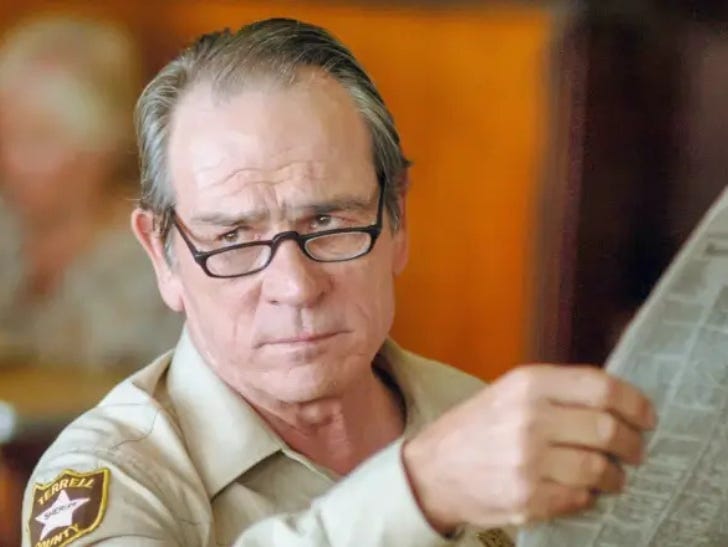Finding Love in an Unlikely Place
The message we need now.
We are living in tumultuous times, to put it euphemistically.
Call me Captain Obvious.
Wars are raging in the Middle East and Ukraine. Politicians in the U.S. are being targeted for assassination, and in one very recent case, actually assassinated. Immigration raids have spurred widespread protests. I could go on.
What is far from obvious, though, is how we might cope with all this upheaval and tragedy.
I found an answer in the most unlikely of places: The conclusion of Cormac McCarthy’s and the Coen Brothers’ “No Country for Old Men.”
Unlikely because “No Country” is a violent neo-Western, every bit as bleak as its setting along the Texas-Mexican border. It’s remembered for its shootouts and bloodshed, for its dystopian revision of Western tropes.
I’m guessing most readers of the novel and viewers of the Oscar-winning motion picture did not find a lot of inspiration in the story. And a lot of people, I know, flat-out disliked the ending, especially if they were eagerly anticipating a final confrontation between good (Sheriff Bell) and evil (Anton Chigurh).
But I firmly believe the ending bears a subtle but important message for all of us, especially in these unsettling times.

In the novel’s concluding scene, right before the ending monologue, Sheriff Bell and his wife Loretta ride horses together at dusk. Sheriff Bell cherishes his wife, and Loretta adores him.
McCarthy writes:
“She smiled and put her hand on his (italics mine). ‘It’s just nice to be here,’ she said.
“Yes mam,” Bell responds. “It is indeed.”
McCarthy fans will know that the quotation marks are mine, too. But that’s not the point.
She put her hand on his.
Despite all of the violence and chaos that Bell encounters throughout the novel, he can still love and be loved. Love won’t make the killing and mayhem go away. But love counts, too. It is real, too.
This is McCarthy’s important point. This is why he chose to end this wild, intense novel in such an understated fashion – even at the risk of disappointing his own readers.
Not that McCarthy came up with this idea on his own. Cormac was a big fan of Dostoevsky, and probably read and reread “The Brothers Karamazov,” the source of one of the best-known passages in all of literature, “The Grand Inquisitor.”
In that passage, Ivan Karamazov conjures up a story about Jesus visiting the Spanish Inquisition. Jesus is promptly arrested and prosecuted for failing humanity. After the prosecutor concludes his scathing argument, Jesus doesn’t mount a defense. He kisses the prosecutor.
Dostoevsky’s point, which evidently made a big impression on McCarthy, was that an expression of love remained a viable option, even amid the darkness and evil of the Inquisition. In Ivan’s story, Jesus couldn’t make the Inquisition go away, but he could insert some love into the universe.
Today, in present circumstances, we’re all Loretta Bell. We’re all Jesus. (Hey, he was Jewish.)
It may not be the only thing we can do. And sorry, Beatles, love is not all you need.
But love is the least we can and should do.
No matter how hairy things get out there – and it could get worse before it gets better – The Alignment advises we double-down on love with family and friends. If you can’t find anyone in your personal sphere to love, then volunteer at a soup kitchen or animal shelter. Whatever it takes.
She put her hand on his.
It doesn’t sound like much. Such a simple gesture. But, right now, it means a lot.
Cormac, thank you for a great ending.



Thanks Jeff for a great message. Much appreciated.